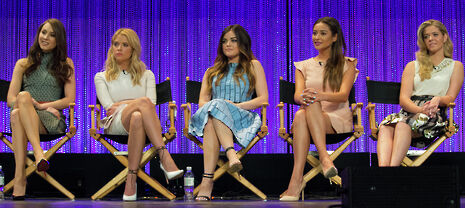
The five man band
Aryehi Bhushan explores the way gender plays into the configuration of the traditional “five man band”

By this point in the term, my thoughts, motivation and general creativity have reached the speed and consistency of very slow-moving molasses, which is to say that I spend a lot of time curled up bed avoiding responsibilities and scrolling through my own personal haven: TVTropes. I flicked past “Childhood Friend Romance”, idly skimmed “Bunny Eared Lawyer” (a character who is both undeniably quirky and undeniably good at their job, for those interested) before finally stopping on the old faithful of the Five Man Band. It’s an arrangement seen time and time again in pop fiction: the heroic, charismatic Leader, the Lancer (generally set up as the leader’s foil in both fighting style and temperament), the quick-witted, comic relief Smart Guy, the tough and gruff Big Guy and the Chick. Seriously, that’s the designated position on the website, with the illustrious writers going further still by emphasising that if “the chick is not played by a female… it’s not a five-man band”.
Take Star Wars, for example: naïve, idealistic Luke is the Leader, with the more cynical, experienced Han acting as his Lancer. Chewie fills in the role of the Big Guy, and the perpetually bickering R2-D2 and C3PO share the Smart Guy spot. And that leaves Leia — princess of Alderaan, diplomat, fantastic liar and crack shot with a blaster, unceremoniously relegated to the role of the Chick. In our central group, we as consumers are presented with a myriad of male personalities, alignments and motivations, but on the flipside, get a single female character shoehorned in in a half-baked attempt to even out the gender ratio and saddled with the constricting and patriarchy riddled role of being the ‘heart’ of the group. In the immortal words of Wendy’s, where’s the beef?
Of course, to be fair to the crew over at Lucasfilm, the five-man band we get from Star Wars is not as clear cut in their roles as I’m presenting them to be. Though Luke is the hero, his boundless compassion and gentle understanding, exemplified by his refusal to kill his father in Return of the Jedi, also marks him out as the heart of the group (a position generally considered to be the Chick’s domain). Similarly, Han can be seen as both the Lancer and the Big Guy, if his scuffles in the Death Star in A New Hope as taken as any indication. However, it is Leia who above all defies neat categorisation. Though she is undoubtedly compassionate, her skills with a blaster, and the fact that she is the one to free Han from carbonite and strangle Jabba, show her as easily fitting into the role of the Big Guy. Furthermore, her position on the team as a diplomat and strategist present her as able to possess the title of the Smart Guy with equal ease. If one were to go further still, the fact that Leia is the only member of the original gang to stick with her role as a leader in the revolution in The Force Awakens suggests that Leia is as much the Leader of the Star Wars saga as Luke is. From this deconstruction of the dynamics in Star Wars, it becomes clear that the constricting and derivative creation of the five-man band (and by extension the reduced rule of the Chick in the band) is not so much a deliberate construction by the media we consume, but rather a by-product of our societal preconceptions influencing the way we consume it.
“In light of this revelation, the five-man band configuration in its most traditional form is not only tired and overdone but also toxic to both men and women”
In light of this revelation, the five-man band configuration in its most traditional form is not only tired and overdone but also toxic to both men and women, as it simply perpetuates the idea that men must remain removed from the domain of emotion, negotiation or understanding, and that women are not capable of possessing charisma, strength or intelligence. When laid out this way, I’d forgive you for rolling your eyes a little at the overdramatic suggestion that the way we consume media is irreversibly tainted by our entrenched socio-political ideas — it’s very end of our times.
However, pop culture has been increasingly subverting traditional thinking surrounding the band by presenting more fluid and interchangeable dynamics. Pretty Little Liars, for all its convoluted twists, questionable law enforcement and somewhat shady age gaps, presents a fascinating five-man band alignment of the main five girls: Allison as the charming, manipulative and duplicitous leader, Spencer as the prickly and overachieving Lancer, Emily as the athletic Big Guy, Aria as the bookish Smart Guy and Hanna as the compassionate and loving Chick. Of course, these descriptions aren’t entirely accurate because all the members of the band are girls (in a fascinating display of differing female personality types), but Pretty Little Liars is also unusual in that Allison ends up with Emily, in a resounding subversion of both heterosexuality and the ‘inevitable’ pairing of the Leader and the Chick. Catching Fire, the second book of The Hunger Games series, also has fun presenting us with a twisty, unconventional version of the five-man band by giving us the Big Guy in the form of the petite, female Johanna and the Chick in the form of Peeta, Katniss’ compassionate, all- loving, male love interest.
In preparation to write this article I dove deep into the murky darkness of the TVTropes examples page, braving stress headaches, joint aches from too-frantic clicking and occasional outrage at grossly miscategorised examples. If my foray has taught me anything, though, it would be that there is nothing inherently wrong with the alignment of the five-man band. In fact, when not shoehorned into two-dimensional and ultimately fruitless alignments based around gender, the five-man band becomes a much more compelling and dynamic construction. By opening up more interpretations in regard to the relationship between gender and archetype, we as consumers are allowed to experience things as “more than” they originally seem: Luke is more than just a hero, Han is more than the cynical second command, and Leia is more than the chick. The possibilities are endless


